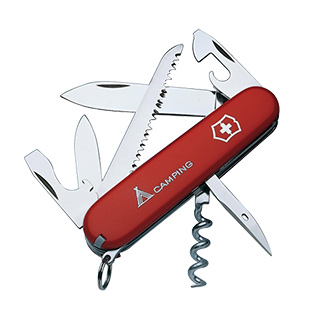- Accessories
- >
- Victorinox Camper Red
Victorinox Camper Red
When you hear the words Swiss Army Knife, chances are you think of the legendary Officer's knife. And that legend continues with the Camper pocket knife. Along with the tent, the sleeping bag and the portable camping stove, the Camper has achieved essential status for anyone looking to spend some quality time in the great outdoors.
Basic laws on knives
It’s illegal to:
- sell a knife to anyone under 18, unless it has a folding blade 3 inches long (7.62 cm) or less
- carry a knife in public without good reason, unless it has a folding blade with a cutting edge 3 inches long or less
- carry, buy or sell any type of banned knife
- use any knife in a threatening way (even a legal knife)
Scotland
In Scotland, 16 to 18 year olds are allowed to buy cutlery and kitchen knives.
Lock knives Lock knives are not classed as folding knives and are illegal to carry in public without good reason. Lock knives:
- have blades that can be locked and refolded only by pressing a button
- can include multi-tool knives - tools that also contain other devices such as a screwdriver or can opener
Banned knives and weapons It is illegal to bring into the UK, sell, hire, lend or give anyone the following:
- butterfly knives (also known as ‘balisongs’) - a blade hidden inside a handle that splits in the middle
- disguised knives - a blade or sharp point hidden inside what looks like everyday objects such as a buckle, phone, brush or lipstick
- flick knives (also known as ‘switchblades’ or ‘automatic knives’) - a blade hidden inside a handle which shoots out when a button is pressed
- gravity knives
- stealth knives - a knife or spike not made from metal (except when used at home, for food or a toy)
- zombie knives - a knife with a cutting edge, a serrated edge and images or words suggesting it is used for violence
- swords, including samurai swords - a curved blade over 50cm (with some exceptions, such as antiques and swords made to traditional methods before 1954)
- sword-sticks - a hollow walking stick or cane containing a blade
- push daggers
- blowpipes (‘blow gun’)
- telescopic truncheons - extend automatically by pressing button or spring in the handle
- batons - straight, side-handled or friction-lock truncheons
- hollow kubotans - a cylinder-shaped keychain holding spikes
- shurikens (also known as ‘shaken’, ‘death stars’ or ‘throwing stars’)
- kusari-gama - a sickle attached to a rope, cord or wire
- kyoketsu-shoge - a hook-knife attached to a rope, cord or wire
- kusari (or ‘manrikigusari’) - a weight attached to a rope, cord, wire
- hand or foot-claws
- knuckledusters
Contact your local police to check if a knife or weapon is illegal.
Good reasons for carrying a knife or weapon Examples of good reasons to carry a knife or weapon in public can include:
- taking knives you use at work to and from work
- taking it to a gallery or museum to be exhibited
- if it’ll be used for theatre, film, television, historical renactment or religious purposes, for example the kirpan some Sikhs carry
- if it’ll be used in a demonstration or to teach someone how to use it
A court will decide if you’ve got a good reason to carry a knife or a weapon if you’re charged with carrying it illegally.

